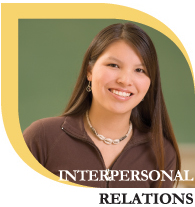Promoting Accord

Promoting accord involves exploring perspectives and underlying interests to reach outcomes that gain the acceptance of all parties. It is allowing Indigenous people the time, space and capacity to reach outcomes from their traditional decision-making practice. It is being willing to put the problem in the centre to work together on an outcome, rather than "competing" to win. It means making the assumption that everyone involved wants to work together and get the best result for all. It is thinking sideways into another perspective and valuing it as strongly as one's own, focusing on strengths and possibilities. It includes behaving in an honest, open way, and expressing organizational limitations (e.g. funding, time, staffing) up front so that all information is available when working towards agreement. It requires excellent communication skills.
Demonstrates the Behaviour When
- Takes time to prepare with background knowledge and information about what Indigenous peoples need and value
- Understands the variation between BC Public Service protocols and Indigenous protocols and uses a respectful approach
- Proceeds with care to test assumptions of cultural knowledge
- Shares information openly, with focus on the trust-based relationship, and encourages others to reciprocate
- Uses a consensus-building approach wherever possible, as opposed to voting or imposition of own ideas and solutions
- May step out of an active decision-making role as traditional decision-making practice happens
- Is aware of and manages own motivations that may directly or indirectly influence the process (core values, cultural values, etc.)
- Gives equal merit to other ways of looking at the situation
- Engages in joint planning throughout each phase
- Looks for common ground, links and similarities in interests and issues
- Seeks understanding of underlying interests
- Analyzes the potential impact of own actions and words before acting
- Notices and lets go of competitiveness, need to win or need to be right
- Cuts through to the heart of the matter, respectfully naming issues that may be obstructing agreement (the "elephant in the room")
- Speaks the truth with respect and takes responsibility for errors
- Tackles the substantive issues in an open and sincere way
- Adjusts behaviour to move the process forward
- Demonstrates empathy and open listening during emotional expressions. Realizes that situations where emotions are triggered may create resistance or inflexibility in self and others. Negotiates from a determination to preserve the relationship
- Refuses to become positional in conflict. Acknowledges the current situation, names it and reframes to the future (possibility)
- When events result in less than the desired result, works to find an alternative solution that still meets mutual needs
- Names indicators of progress that show movement towards accord and agreement
- Initiates and models cooperation to encourage cooperation in others
- Uses a position of power to encourage cooperation and mutual satisfaction
Needs Development When
- Engages in a process or relationship unprepared
- Fails to seek out and apply knowledge of cultural values and appropriate protocols
- Chooses meeting locations and times according to own schedule and guided only by considerations of cost-savings or personal convenience
- Waits to engage Indigenous people until all decisions have been made
- Does not disclose information early and openly
- Avoids addressing issues of others
- Interprets all statements, expressions and stories literally
- Stays on the surface of the issue instead of exploring the root causes to look for mutual interests
- Uses mainstream approaches to arrive at a solution, such as imposing or voting
- Shows preoccupation with "selling" own position as opposed to exploring underlying interests and possibilities
- Pushes to a solution before safety and trust are present
- Points out gaps and deficits in getting to agreement
- Argues or avoids when the situation calls for active cooperation
- Demonstrates a need to look good to the people they represent at the cost of others
- Demonstrates evasiveness when decisiveness is called for
- Fearing unknown consequences leads to using processes proven not to work
- Uses competitiveness, need to win or need to be right to get to a result
- Argues over words and phrases as agreement emerges, and stalls the process
- Becomes entrenched and refuses to rethink position
- Escalates situations of diverse perspectives into full blown conflict
- Places responsibility for getting to an outcome on others
- Uses position to express power over others
- Takes action that meets public service needs but harms the relationship
